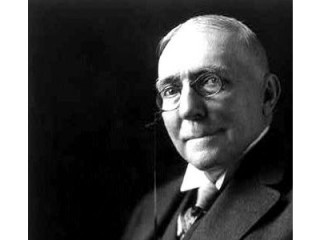
James Whitcomb Riley biography
Date of birth : 1849-10-07
Date of death : 1916-07-22
Birthplace : Greenfield, Indiana
Nationality : American
Category : Famous Figures
Last modified : 2011-07-15
Credited as : Writer, poet,
James Whitcomb Riley was born on Oct. 7, 1849, in Greenfield, Ind. His father, a successful small-town lawyer, allowed him to shape his education by instinct rather than formal precedents. Oratory, drama, painting, and music took James's earliest attention. He idolized Charles Dickens. Poets Robert Burns, for dialect verse, and Henry Longfellow, for moral precepts, were his models. Young Riley wrote voluminously and saved every scrap, particularly the local-color sketches, incorporating anecdotes he heard from the country people around the courthouse. His musical ear was good; he played the violin, guitar, and banjo. His verbal ear was even better.
At the age of 16 Riley left school to become a "house, sign, and ornamental painter," wandering around Indiana. He read law for a while but took to the road with a traveling medicine man from whose wagon he learned to entertain the public with recitations in dialect. When he returned to Greenfield, he started a career in journalism, beginning with the local paper and expanding his horizons gradually. At one time he was local editor of the Anderson Democrat.
The Indianapolis Journal's invitation to join its staff was the door to success. Riley published his dialect poems under the name "Benjamin F. Johnson of Boone," and by 1883 the demand was enough to issue a pamphlet edition. Calling his first collection The Old Swimmin' Hole and 'Leven More Poems, he did not need a public-opinion poll to tell him he had found his metier. He sold more than half a million copies of this book, followed it with 40 more books before his death, and on platforms across the country entertained audiences with homely philosophy and dramatic monologues. Old-Fashioned Roses (London, 1888) captured an English audience. Pipes o' Pan at Zekesbury (1888), Rhymes of Childhood (1890), and Here at Home (1893) expanded his American reputation.
Riley's attractions were personal, not cerebral. His win-some nature was contagious in a public gathering, and he was determined to give his listener "simple sentiments that come from the heart." His poems were never burdened with ideas, complexities, ambiguities. He invented a whole gallery of Hoosiers; Riley was the first to admit that they spoke patent cliches in a dialect such as no real Hoosier ever spoke. At his best, he captured a tranquil America, wholesome, eccentric, sentimental, bucolic. "The Raggedy Man," "Little Orphant Annie," and "Nine Little Goblins" attest to his vitality within his limited range. He died on July 22, 1916.
















